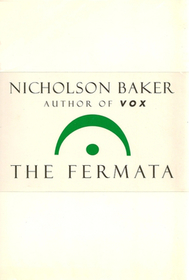Helpful Score: 4
The Fermata is the most risky of Nicholson Baker's emotional histories. His narrator, Arno Strine, is a 35-year-old office temp who is writing his autobiography. "It's harder than I thought!" he admits. His "Fold-powers" are easier; he can stop the world and use it as his own pleasure ground. Arno uses this gift not for evil or material gain (he would feel guilty about stealing), though he does undress a good number of women and momentarily place them in compromising positions--always, in his view, with respect and love. Anyone who can stop time and refer in self-delight to his "chronanisms" can't be all bad! Like Baker's other books, The Fermata gains little from synopsis. The pleasure is literally in the text. What's memorable is less the sex and the sex toys (including the "Monasticon," in the shape of a monk holding a vibrating manuscript) than Arno's wistful recollections of intimacy: the noise, for instance, of his ex-girlfriend's nail clipper, "which I listened to in bed as some listen to real birdsong."
AMAZON.COM REVIEW
AMAZON.COM REVIEW
Helpful Score: 3
I got this book because I read Baker's non-fiction book, "Double Fold" in library school, and thought it was very interesting and well-written. 'The Fermata' is quite different! Basically, it's porn. But not porn that I found appealing. It's written in the form of a memoir of a seemingly ordinary man who works as a temp transcriptionist - who has the ability to stop time. Rather than using this power to do any of the obvious possibilities (heists, assassinations, blackmail(?)), he uses his time in 'the fermata' pretty much exclusively to molest women. Morally, he tries to justify himself by saying that he's not hurting anyone - the women are totally unaware about what's been done to their frozen, unresponsive bodies, so what's the problem? The character has an ex-girlfriend, who broke up with him because she was disturbed and repelled by what she believed were his fantasies regarding these actions - and I'm totally with her: the exciting thing about sex is the seduction, the interaction. Molesting mannequin-like, unmoving bodies is thoroughly unexciting. Later in the book, when the narrator decides to try his hand at writing erotica (and placing it for women to read), the stories presented as his writing aren't terribly my cup of tea, either. This is undeniably a well-done book, but it is just meant to appeal to people with different fantasies than mine.
Helpful Score: 1
The Fermata is the most risky of Nicholson Baker's emotional histories. His narrator, Arno Strine, is a 35-year-old office temp who is writing his autobiography. "It's harder than I thought!" he admits. His "Fold-powers" are easier; he can stop the world and use it as his own pleasure ground. Arno uses this gift not for evil or material gain (he would feel guilty about stealing), though he does undress a good number of women and momentarily place them in compromising positions--always, in his view, with respect and love. Anyone who can stop time and refer in self-delight to his "chronanisms" can't be all bad! Like Baker's other books, The Fermata gains little from synopsis. The pleasure is literally in the text. What's memorable is less the sex and the sex toys (including the "Monasticon," in the shape of a monk holding a vibrating manuscript) than Arno's wistful recollections of intimacy: the noise, for instance, of his ex-girlfriend's nail clipper, "which I listened to in bed as some listen to real birdsong."
AMAZON.COM REVIEW
AMAZON.COM REVIEW




